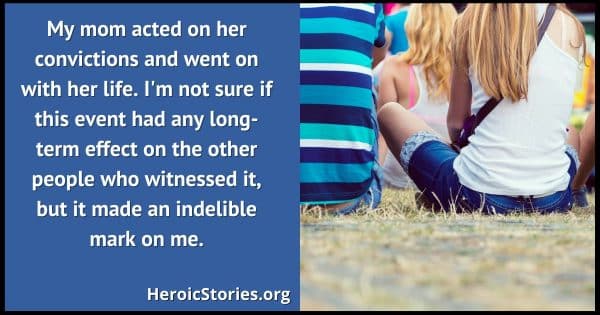By Paul Fessenden
Florida, USA

The Vietnam War was raging, and President Nixon had announced that Cambodia had been bombed by America. I was a high school junior. The local college students went on strike to protest what they perceived as crimes against humanity by their government. It was a beautiful spring day in May of 1970. The college campus, a quarter mile from my school, teemed with striking students sitting around singing folk songs, catching some sun, and throwing Frisbees… all much more appealing than my high school classes.
I wish I could say that a deep-seated moral conviction drove me to skip school that day, but I have to admit that it had much more to do with college girls and the free love ethic that infected our generation.
The students had hung a sheet from a brick wall in the courtyard. On it was painted a bloody fist and the word STRIKE! in two-foot-high letters. Some students sang, some drank beer, and a few smoked pot, but mostly we just sat around feeling good about ourselves because we were doing our part to end the war. (How naive that sounds today!)
As I sat flirting with a very cute coed, a school bus pulled up. To my dismay, it was my mother’s bus (she had driven bus for several years), and down the steps she came, as mad as I’d ever seen her. My first thought was, “How could she have seen me in this big crowd?” But it became apparent that she hadn’t seen me; she was headed into the crowd.
My mother is a no-nonsense woman. Five feet tall, she raised six boys and didn’t put up with actions and attitudes that she considered foolish. This occasionally embarrassed her boys because she was more outspoken than other moms — but on reflection, she was usually right in her thinking.
Up to the wall she marched with hundreds of students watching. A deafening silence fell when she reached up, pulled the sheet from the wall, wadded it up, and tossed it into a trash can. She wheeled around and shouted, “If you’re striking for peace, you do not need to use a bloody fist as your symbol!”
She calmly climbed back in her bus and drove off. The crowd was silent for a full three seconds before a faculty member started applauding. Before I knew it, the entire crowd was cheering this little woman who had dared to confront this mob.
I’m not sure that my dad or any of my brothers ever knew about this incident. I couldn’t tell them — I wasn’t supposed to be there. My mom acted on her convictions and went on with her life. I’m not sure if this event had any long-term effect on the other people who witnessed it, but it made an indelible mark on me.
Podcast: Play in new window | Download (Duration: 4:20 — 4.0MB)


I would love to know if Paul ever told his mom what her action that day meant to him.
I would bet that was at Kent State. Sad to say, that protest did not end well.
I would have like to have known your mom, and if she is still alive, give her a huge pat on the back…………
Being of about the same” generation,” (matriculated college 1972), Chaves’s United Farm Workers of America comes to mind. (same sign at/in my college cafeteria). Didn’t keep me from grabbing lettuce salads from SAGA food-service-at-the-time. Random signs are… humorous.
Ah, yes. The best lessons are taught by example. Cheers for your Mom for teaching (even though she didn’t know you were there!), and cheers for you getting the message on several levels!
I am torn by this story. I highly commend the students for protesting that war, which was disastrous for both (all) sides. Against that, I understand that the strikers’ motives were not entirely sincere, and that their insincerity was visible in several ways. The moral issues in this story are much more complicated than in most of this excellent series.
What the mother did gave the right message, in this mixed symbolism, but the strikers would have had to think to understand it. Apparently, at least one of them, and therefore probably many, did.
We certainly reap what we saw. The mother went there to do a general good, but she didn’t think it would impact immediately on her son. Moral, It’s good to be good.
On a general level, I just wonder- why are most of these stories from long ago- fifties, sixties, seventies? Have we stopped doing good in these present times? I would love to read stories of 2016! And I challenge myself to produce one soon.
Thank you all
The majority of HeroicStories stories come from our backlog of over 850 stories that were previously published between 1999 and 2014. Your commitment is exactly what we need: we rely on submissions of new stories. There have been a few published in recent months, but not enough come in to keep pace with our twice-a-week publishing schedule (and not all that come in meet our requirements).
i will do some thinking and try to come up with a story to share – i have greatly enjoyed reading your stories, am sure this sort of thing still happens, but for whatever reason(s), people are not moved to share, or they may not know about this great page of stories. thank you for doing this.